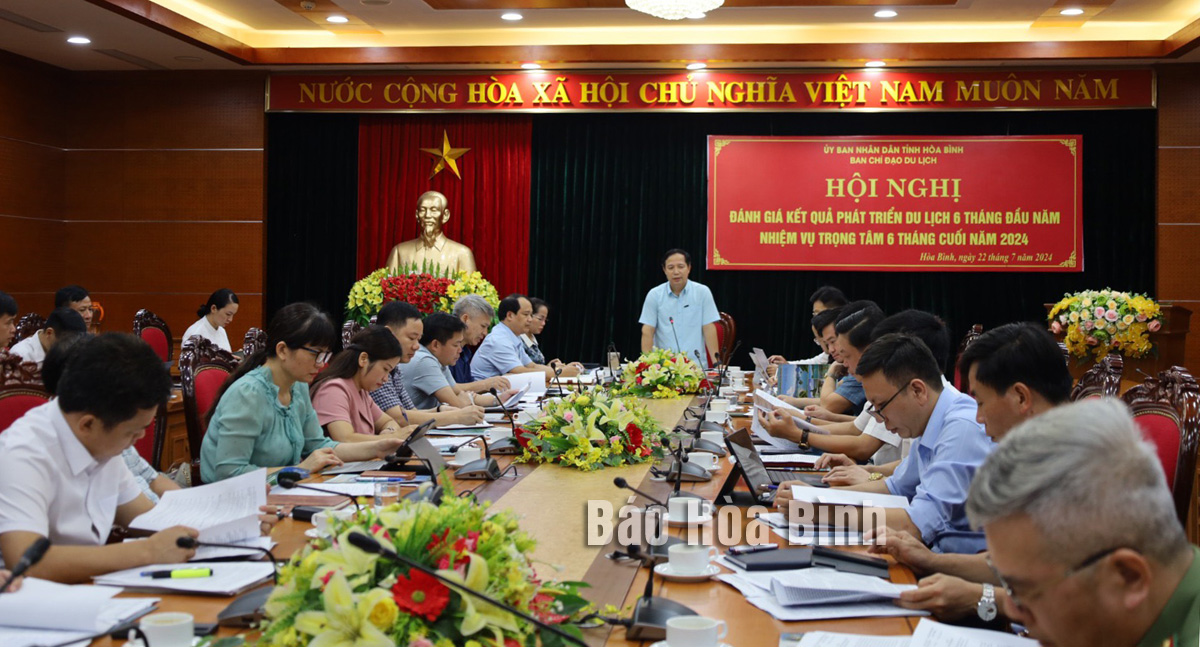
On July 22th, the Provincial People's Committee held a conference to evaluate the results of tourism development in the first six months of the year and to implement key tasks for the last six months of 2024. Mr. Nguyen Van Toan, the Standing Vice Chairman of the Provincial People's Committee and Head of the Provincial Tourism Steering Committee, chaired the conference.

Mr.Nguyen Van Toan, the Standing Vice Chairman of the Provincial
People's Committee, was making a speech to conclude the conference.
In the
first six months of the year, the resolutions, the plans, programs, the
projects, and development plans for tourism from the central and local levels
have been actively implemented by the members of the Provincial Tourism
Steering Committee. The general planning for constructing the functional areas
and subdividing zones has been gradually deployed, particularly the sub-zoning
plans for the tourism area within Hoa Binh Lake. The efforts in developing
tourism products, training the human resources, and the environmental
protection were emphasized. Additionally, cooperation in tourism development
and the promotion of tourism has been intensified.
In the
first six months, the province welcomed nearly 2,890,000 turns of visitors,
increasing 12.9% compared to that of the same period, achieving 69% of the
annual plan. Of these, there were nearly 291,500 turns of international
visitors, reaching 58.3% of the plan. The total revenue from tourism reached
2,928 billion VND, increasing 32.8% compared to that of the same period, achieving
63.7% of the annual plan.
The
representatives from various sectors and the localities discussed the
difficulties and obstacles they encountered during the implementation of
tourism investment projects and the management of the spontaneously emerging
tourism spots in the area.
The Standing Board of the Hoa Binh provincial Party Committee has agreed in principle on a proposal by the Standing Board of the Party Committee of Hoa Binh city to gather feedback on the city’s 1:2000 zoning plan, which forms part of its broader urban development strategy.
Hoa Binh province has made notable progress in public administration reform and digital government development, with the satisfaction index among citizens and businesses reaching over 84%, according to recent government evaluations.
Thanks to great efforts by local authorities in recent times, the governance and public administration performance of Mai Chau district has been significantly improved.
In the afternoon of June 6, the Party Committee, the People's Council, the People's Committee and the Fatherland Front of Lac Son district solemnly held a meeting to celebrate the 139th anniversary of the district's founding (1886–2025) and the 79th anniversary of the establishment of the district's Party Committee (1946–2025). There was the attendance of Mr. Bui Van Thang, the Vice Chairman of the Provincial People's Council; Mr. Quach Tat Liem, the Vice Chairman of the Provincial People's Committee; Ms. Dang Bich Ngoc, the Deputy Head of the National Assembly Delegation of the province; as well as the former leaders of the province and district through various periods, who are the natives of the district.
Implementing the Politburo’s Resolution No. 57-NQ/TW on breakthroughs in science – technology, innovation, and digital transformation is a golden opportunity for the northern mountainous province of Hoa Binh to renew growth model, improve competitive edge and shorten digital gap.
Resolution 57-NQ/TW, issued by the Politburo on December 22, 2024, identifies sci-tech, innovation, and digital transformation as strategic breakthroughs to build a developed and prosperous nation. In Hoa Binh province, this spirit is not just a slogan, it’s being put into action through concrete initiatives that form a "new development triangle”: digital citizenship, digital economy, and digital administration.



